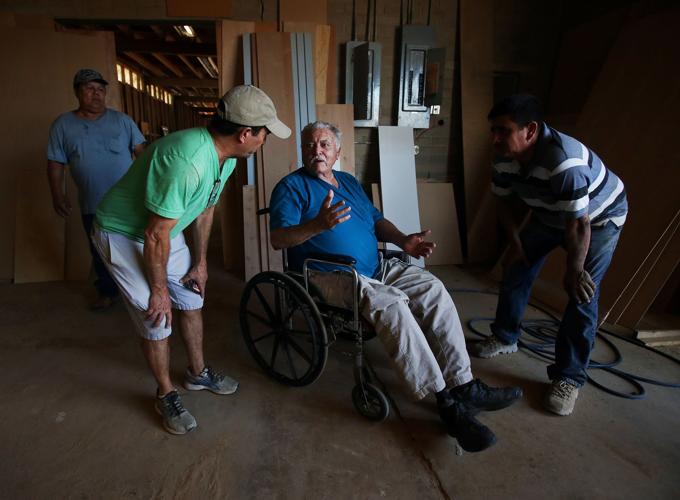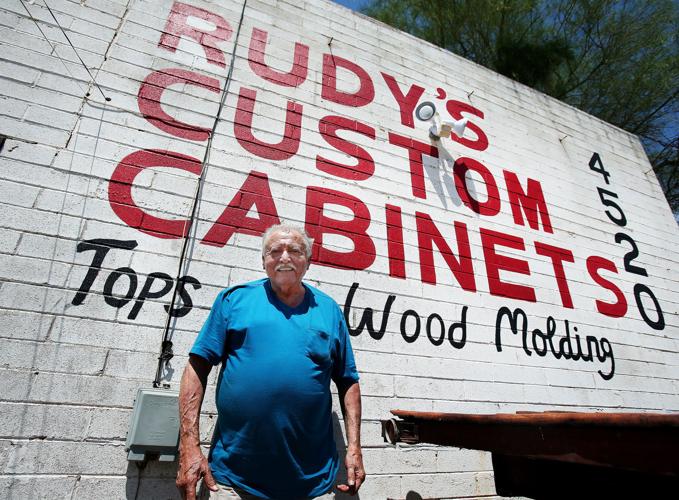When Rudy Desjardin was 16 years old, he applied for a job. But he fibbed a bit. He told his future employer he was 18.
That was 70 years ago. Desjardin began working in a four-year carpentry apprenticeship program at the old Southwestern Sash & Door Co. on East Stevens Avenue. It sat along the railroad tracks, next to the old O’Malley Lumber Co., where two well-known bars, O’Malleys and Maloney’s, are today on North Fourth Avenue.
His father, Solomon Desjardin, was a carpenter and the younger Desjardin figured he would follow that path. As it turned out, it suited him.
“I liked to work with wood,” he said.
And for seven decades, that is what Tucson-born Desjardin did: work as a cabinet maker and carpenter. From Southwestern Sash he moved to Arizona Sash & Door on West St. Mary’s Road. Later he opened his own shop, Rudy’s Tops and Custom Cabinets, on South Country Club Road near East Irvington Road.
People are also reading…
On Friday, Desjardin, 86, stopped working. He closed his custom cabinet shop of the last 42 years, ending a craftsman career which allowed he and his wife, Lupe Aguilar Desjardin, to raise six children.
“I worked hard. I was good at it,” he said while several employees helped clear the dusty shop of tools, machinery, and various sizes and shapes of boards, sheets of wood and molding. Contractors and carpenters were buying and taking what they could use.
Earlier last week he sold a 130-year-old, 3-ton router that still worked. He bought it years ago at a salvage shop.
Desjardin’s daughter, Darla Tawney, helped her father manage the shop in recent years. She was melancholy about the closure but took solace that the men who came to claim tools and machines — some of whom have known her father for years — will put them to good use.
“It’s nice to see that the tools will continue to be used,” she said.
It’s rare for anyone to have worked so many years as Desjardin, much less doing the same work. Desjardin is a throwback to a different era, a different work culture and environment, unlike today where people move from job to job and often change careers.
Desjardin said he enjoyed his life working with wood, creating beautiful objects. He left people — and himself — satisfied with his work.
But like other aspects of our modern lives, yesterday’s custom cabinet shops are disappearing, succumbing to economies of scale, big-box competition and pre-fab products. Custom cabinets take time, labor and money.
Desjardin felt the pressure. In recent years he struggled to keep the shop open and keep his handful of employees on the job.
“I’m quitting because of the economy,” said the bilingual Desjardin.
He developed his work ethic as a youngster. He grew up in the Iron Horse neighborhood, near the Coronado Hotel on the corner of East Ninth Street and North Fourth Avenue, across the street from Southwestern Sash.
One of his first jobs was to sweep the floor at the old KVOA radio station, where Don Jacinto Orozco broadcast his pioneering Spanish-language programs. Desjardin also worked at the old Myerson’s White House, a clothing store on West Congress Street, and at the old Seven-Up Bottling Company on North Oracle Road, a couple of blocks up from West Grant Road.
After leaving Safford Junior High School, he did not go to Tucson High School. He went to work.
“I needed to make a living,” he said.
He could have shuttered his shop years earlier because of health issues. In 1987, he underwent quadruple bypass surgery and spent several weeks in the hospital.
“I just made it,” he said.
He “just made it” again four years ago when both his legs were amputated below the knee because of diabetes. He went under the knife 12 times as surgeons removed his toes, then his feet, then finally his legs.
“I had lousy doctors,” he complained. When he initially complained of pain in his feet, a doctor prescribed pain medication, ignoring wider symptoms.
After his limbs were amputated, Desjardin didn’t stop working at the shop. But his duties changed. He spent most of his time in the office taking orders, shuffling invoices and managing the shop. It wasn’t easy navigating the busy, crowded workshop in a wheelchair.
But he did.
“I still don’t worry,” he said. “You can’t do anything about it.”
Ernesto “Neto” Portillo Jr. is editor of La Estrella de Tucsón. Contact him at
or at 573-4187.








